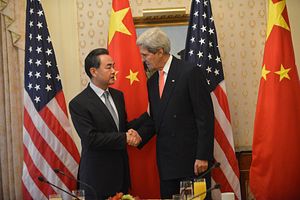Chinese Foreign Minister Wang Yi arrived in Washington, D.C., on Tuesday for a three-day visit. The exchange comes amid heightened tensions over Chinese military assets in the South China Sea, as well as lingering disagreements over how to best rein in North Korea’s nuclear program.
In announcing the visit, China’s Foreign Ministry said Wang and U.S. Secretary of State John Kerry would discuss “the bilateral relationship as well as issues of common interest.” Foreign Ministry spokesperson Hua Chunying said the North Korean nuclear issue would be on the agenda. On the South China Sea, while urging the United States to “stop sensationalizing” the issue, Hua argued that “the issue of the South China Sea is not and should not become an issue between China and the U.S.”
U.S. State Department spokesperson Mark Toner said Monday that Kerry and Wang would discuss “the full breadth of issues in the bilateral relationship with China, including climate change, of course; our response to North Korea’s ongoing violations of existing UN Security Council resolutions; cyber security; as well as other issues of concern.”
Kerry paid a visit to Beijing in late January, mainly to discuss the North Korea issue. Ahead of his arrival, China made sure to emphasize its unwillingness to change tactics, instead blaming Washington for the current impasse with Pyongyang. After Kerry’s visit, however, North Korea conducted a rocket launch, again bringing international condemnation. Since then, Chinese officials have publicly indicated a willingness to pursue sanctions in the United Nations.
On Tuesday, during a joint press conference with Wang, Kerry said that both sides “agree completely” that North Korea’s recent actions “merit an appropriate response through the United Nations Security Council.” He said that the United States and China “have made significant progress” to that end, with talks being “very constructive in the last days.” According to Kerry, a draft resolution “is currently being evaluated” by both sides.
Wang, too, spoke of “important progress” on UNSC consultations. “We’re looking at the possibility of reaching agreement on a draft resolution and passing it in the near future,” Wang said, noting that the new resolution “can effectively limit further progress” on North Korea’s nuclear program.
However, Wang also stressed China’s position that sanctions “cannot provide a fundamental solution to the Korean nuclear issue … the goal is to get back to the negotiations,” with the Six Party Talks being China’s preferred format. Wang outlined China’s basic proposal of pursuing “parallel tracks” of negotiations on denuclearization and a peace agreement to formally end the Korean War, but said “China is open to new ideas” as well.
Kerry, meanwhile, stressed that the United States also believes that a final solution must be a negotiated one. The “goal of this is not to be in a series of cycling, repetitive punishments,” Kerry said, but rather to bring North Korea back to the negotiations table. He explained that North Korea can “rejoin the community of nations” and “ultimately have a peace agreement with the United States… if it will come to the table and negotiate denuclearization.”
Interestingly, Wang did not mention the possible deployment of the THAAD missile defense system in South Korea during the press conference. China has previously strongly objected to deployment of the U.S. system on the Korean peninsula, arguing that it poses a security threat to China.
Overall, both sides focused on the common ground of their basic position. As Wang put it, “both sides do not accept the DPRK’s nuclear missile program, and we do not recognize the DPRK as a nuclear weapon state.”
On the South China Sea disputes, Kerry and Wang were less successful in presenting a united front. The issue has been fraught recently, with Kerry previously suggesting that, by deploying surface-to-air missiles on Woody Island, China had violated a promise from Xi Jinping not to militarize the disputed islands. However, Xi’s September 2015 comment that “China does not intend to pursue militarization” was in reference specifically to the Spratly Islands, not the Paracels, of which Woody Island is a part.
China fired back just ahead of Wang’s visit, with Foreign Ministry spokesperson Hua arguing Monday that “There is no difference between China’s deployment of necessary national defense facilities on its own territory and the defense installation by the U.S. in Hawaii.”
On Tuesday, Kerry stressed the importance of solving the issue through peaceful negotiations, “not through unilateral actions.” He also mentioned the importance of “true” demilitarization in the region. “[T]here have been steps by China, by Vietnam, by others, that have unfortunately created an escalatory cycle,” Kerry said. “What we’re trying to do is break that.”
Wang, meanwhile, countered that “non-militarization is not the responsibility of one party alone.” He spoke out against “close-up military reconnaissance” and the dispatch of missile destroyers and strategic bombers to the region—actions China has previously criticized the United States for undertaking.
The topics of North Korea and the South China Sea dominated both the prepared remarks and the two questions from the press that followed, but Wang wanted the press to know that the talks had a “very extensive agenda.” Kerry specifically mentioned discussions on cyber issues, human rights, nonproliferation, climate change, and the Syria issue (with a lengthy digression to plead for the successful implementation of the latest ceasefire).

































